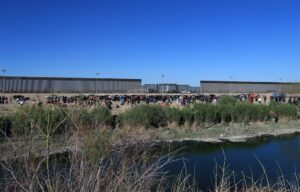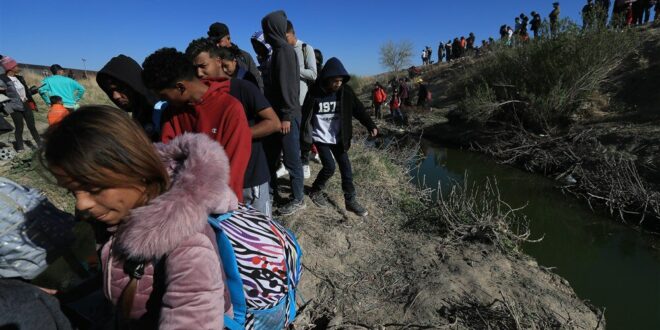Source: Radio-Television Vojvodina
Photo: EPA-EFE/Luis Torres
Novi Sad, January 31, 2025 – In recent years, the world has been steadily shifting towards the right, a trend that has gained momentum since the 2008 financial crisis—one of the most severe economic downturns in modern history. Since then, the concept of social democracy has faced continuous setbacks due to successive crises, while nationalist and populist movements have gained strength, bringing with them increasingly restrictive anti-migrant policies. The return of Donald Trump to the White House would serve as a “tailwind” for right-wing movements across the globe, particularly in shaping attitudes towards migration. How will the White House’s initial decisions on deportations impact the rest of the world?
Trump’s Promised Deportations Spark Alarm in the Region: Thousands of Migrants Stranded “Midway” – Without Entry Visas or Passports
Mexican authorities have begun constructing massive shelters and setting up tents in the city of Ciudad Juárez to prepare for the influx of their citizens in response to the promised mass deportations from the United States. Amid a wave of legal proceedings and raids carried out by the new administration of Donald Trump, children have also been caught in the middle. Sara Márquez is the owner of a Mexican restaurant in New York. Her children are beneficiaries of a program that allows them to qualify as “legally present” in the United States. Now, everything has been brought into question – her family, her business, and the fate of her employees:
“We have been in business for five years. My lease has expired. I had to talk to my landlord and tell him that I don’t know what will happen. I don’t know how much longer I can extend the lease because I don’t even know what awaits me or whether I will be deported. My family runs two businesses, and thank God, we employ people from the community. I try to tell my family, my staff, everyone: ‘Hey, you know, we can do this, everything will be fine.’ But how can I say that when I don’t even know if Trump will revoke the program in two years?” said this worried New Yorker.
At the end of last week, Colombia was on the brink of a trade war with Washington due to its refusal to cooperate with Trump’s deportation program. Among the first to be affected by the anti-migrant measures were Venezuelan nationals who had just begun their journey to the United States. The cancellation of thousands of so-called security permits, which allow for legal travel and entry, as part of Donald Trump’s first executive orders, has left thousands of migrants stranded in precarious situations—stuck halfway, without permits and without passports that would allow them to return.
“I have been here for 11 months. I think it’s time to return to my country, unfortunately. I came here to apply for a safe conduct permit, which was supposedly issued five months ago. Two months ago, I found out that they won’t give it to me and that they are asking for a passport, which costs me $420, $430. I will get it in five months, but how can I live here when I don’t have a stable job?” testifies one of the “stranded” immigrants, whose life has become even more complicated due to Trump’s decisions.

Photo: EPA-EFE/Luis Torres
Based on analyses from the latest population census, there are approximately 11 million so-called unauthorized immigrants in the United States. Among them, around 5 million are Mexicans, with several hundred thousand lacking personal documents. This situation is creating a new crisis and instability on both sides of the American continent. A similar impact was observed during previous crackdowns, such as the construction of the border wall with Mexico, explains Radoš Đurović, Director of the Asylum Protection Center:
“These intensified border measures have only played into the hands of smugglers, who have raised their prices and made border crossings much riskier, yet they have not stopped the tens of thousands of people arriving. The U.S. is now a different society. Once a nation built on immigration and refugees, it is now attempting to seal itself off due to deteriorating living conditions and internal social unrest. These efforts face strong opposition from the American public, particularly the judiciary, which remains entirely independent and acts as a major barrier to Donald Trump’s executive powers and the actions of federal agencies at the border. This will continue to destabilize the situation in the U.S., further radicalizing debates, as a significant portion of the population opposes these measures. Moreover, it will place immense pressure on Mexico and other neighboring countries to prevent migrants from reaching the U.S. border in the first place. This means substantial financial and political investments will be required for Central American countries, which are closer to the U.S. border, to serve as de facto hubs or hotspots for refugees,” Đurović explained to Radio Novi Sad.
Đurović also raises concerns about the feasibility of Trump’s plan, considering that an operation of such scale would likely take years, incur enormous costs, and face strong resistance within American society. While the new White House administration is issuing its first directives to immigration services and law enforcement, institutions, legal teams, and organizations that systematically address this issue are not standing idly by.
Murad Awadeh, Executive Director of the New York Immigration Coalition, delivered an important message: “Lawsuits have begun. The fight will continue, and we have a massive task ahead. But the most important thing is for our communities to know that they have rights. They have the right to remain silent if approached by immigration authorities or any agency that intercepts and questions them on the street. We are fighting for our communities to stay in the state of New York.”
Europe Prepares for the Return of Its Citizens While Still Struggling with the Wave of Irregular Migration
Although Latin American countries are the first to be affected, others are also preparing for the return of their nationals—including European states. Among the first to respond was Polish Prime Minister Donald Tusk, who stated that Warsaw is ready to face deportations.
“Following the initial announcements of possible mass deportations of illegal immigrants from the United States, I have asked the Minister of Foreign Affairs to ensure that our consulates and Polish services based in the U.S. are prepared for the potential consequences of these decisions. This could affect Poles who work and live in America with various legal statuses. We currently do not have information on whether and to what extent this operation will impact Polish citizens in the U.S. However, Warsaw’s diplomatic missions must be prepared for an influx of Poles who may feel concerned about Trump’s potential actions. Every returning Pole will be warmly welcomed. Everyone will find a place for themselves in their homeland,” Tusk assured. At the same time, he announced a stricter policy toward migrants arriving in Poland. Despite the fact that this stance puts Poland at odds with Brussels, the country has already begun investing in stronger border infrastructure in an effort to reduce crossings, guided by its policy of national protection.
However, it seems that Germany has taken this form of extremism the farthest. The country that, under Angela Merkel, welcomed hundreds of thousands of migrants now wants to remove them as quickly as possible. Riding the wave of growing anti-migrant sentiment, the far-right Alternative for Germany (AfD) has risen to prominence, making migration the central issue of its campaign for the upcoming elections. The party’s leader and potential future chancellor, Alice Weidel, stated:
“Because we must save Germany, as our homeland has fallen into a clear imbalance. No issue moves people as much as having to watch our cities become increasingly unsafe. I have been criticized for my speech because I used the word remigration. I will repeat it here—now we need remigration in order to live safely.”
What is the fate of the Western Balkans?
Has such a policy gained additional momentum with Donald Trump’s return to the White House, and is Europe facing a new escalation of cross-border pressure on illegal migrants? Radoš Đurović warns that this development is realistic, yet at the same time, contradictory:
“Trump’s rhetoric and measures will certainly give momentum to more radical positions of right-wing and far-right parties in Europe, which are already building their political programs around this narrative and achieving considerable success. Therefore, we can expect to see a rise in anti-migrant policies in the Balkans as well. However, this approach clashes with reality. We see this contradiction even in Germany, which is simultaneously signing agreements to bring in labor from Asia and Africa while advocating for stricter migration controls. These are contradictory messages, yet political elites still believe they can capitalize on fear, the lack of integration, misunderstandings, and isolated incidents to gain political points. Many political leaders recognize that by worsening public sentiment toward migration and increasing antagonism, they can make it even harder for migrants to settle in local communities. But from our experience on the ground, we know that such an approach only leads to greater problems. These people will not simply disappear; instead, they will become further isolated and discriminated against. At that point, they are no longer just victims but also perceived as a source of problems,” explains Đurović.
 Photo: Ministry of Interior
Photo: Ministry of Interior
It is essential to mention the so-called Balkan route, one of the main migratory pathways into Europe. How complicated is this situation for Serbia? Radoš Đurović warns that the Western Balkan countries, including Serbia, will continue to share the fate of transit states, making it crucial for societies in the region to manage migration effectively:
“These areas will become in a way ‘war zones’ where migrants are expected to be physically stopped and returned to their countries of origin. This raises numerous concerns—ranging from compliance with the legal frameworks of Western Balkan and transit countries, which are now turning into ‘hotspots,’ to human rights issues and the methods used to stop migrants, protection from potential abuses and violence, and the expansion of smuggling networks that exploit these restrictive policies. A great deal will be expected from transit countries. They will be seen as barriers, required to build capacities similar to those in Albania or otherwise assume responsibility for preventing migration from reaching the most developed parts of the world.”
“The people arriving will not stop coming,” notes the interviewee for Radio Novi Sad, adding that the only real solution to global migration is to create conditions for a normal life in the countries of origin or in the surrounding regions.
“With all the upcoming restrictive measures—from physical barriers to financial constraints and political pressures aimed at compelling transit countries to be more effective in stopping these people—it will be difficult for local societies to adapt to this issue, especially if the political elite’s narrative begins to shift, mirroring that of destination countries. If the Western Balkans, including Serbia, were to change their stance on refugees and migrants and start blaming them for economic, security, and other issues, we would be fostering antagonism within our societies. I’d like to remind everyone that Serbian society itself has a history of displacement and deeply understands why people flee. If we antagonize society the way it is happening now in Germany, it will be incredibly difficult to reach any kind of agreement. Even those same political elites would later struggle to regain control over the situation.”
Donald Trump has declared illegal immigration in the United States a national emergency. This situation is already spilling over to the country’s southern neighbors, while the rest of the world closely watches Washington’s next moves and decisions. Immigration and reform of the system have been a subject of political battles in the U.S. for decades, with consequences felt by all.
More details in the audio recording, available at: https://rtv.rs/sr_lat/politika/tramp-i-migranti-da-li-je-na-pomolu-nova-kriza-u-svetu-(audio)_1603017.html
 AzilSrbija AzilSrbija
AzilSrbija AzilSrbija


![As the government pushes back against court rulings, concerns about political interference and threats to the independence of the judiciary are growing, raising alarm both in Italy and internationally. [EPA-EFE/DONATO FASANO]](https://www.azilsrbija.rs/wp-content/uploads/2024/10/slika-meloni-310x165.jpg)


